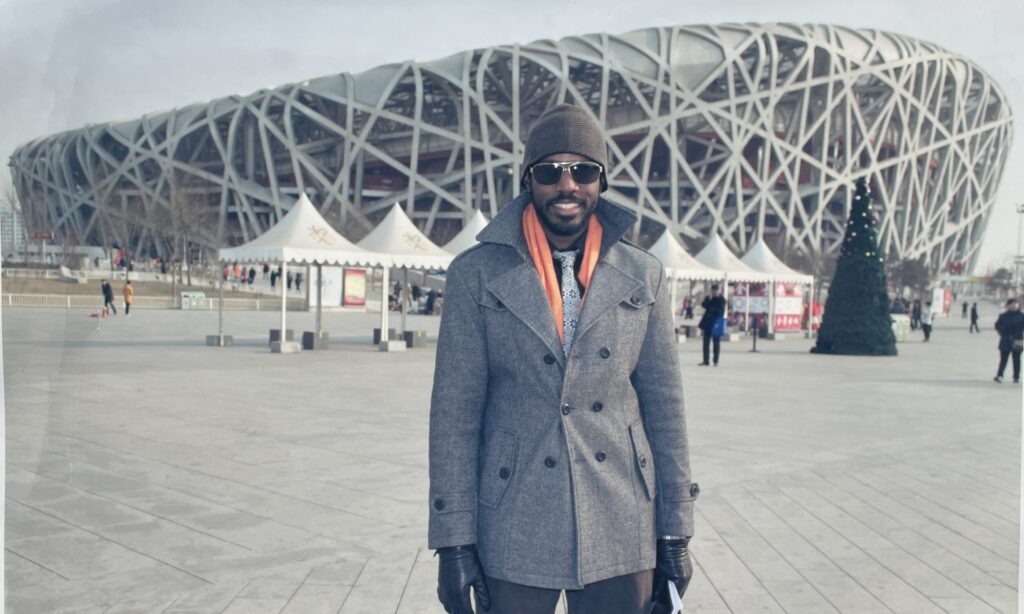
All views expressed are Obio’s and do not necessarily reflect those of the U.S. Department of State.
My introduction to formal Mandarin language learning was during my first days as a college freshman in 2000. My Chinese professor founded the Associated Colleges in China (ACC) program in Beijing and, in her mind, if you showed up to her class on the first day, you absolutely were going to study in her program in Beijing two years later. In my second week of college, I had a revelation that, if I just got decent grades in Chinese, I could travel outside of the United States for the very first time and enjoy a privilege that had previously been out of reach. It was a powerful motivator, and it confirmed my decision to choose Chinese as one of my majors.
I did, indeed, get my first international trip and it came in March 2001 during spring break freshman year when my professor had our class visit the ACC program to get an idea of what lies ahead for when we do the full semester of strict language immersion in China’s capital. I was surprised during that visit by how much I was able to engage with Chinese people in Mandarin after only studying the language for six months. At the Forbidden City, Chinese tourists who just wanted to pose for pictures with me via universal hand gestures immediately lit up with excited relief once they heard me speak Mandarin. We got to know each other until their rapid-fire responses maxed out my intro Chinese level. That experience was 20 years ago and it remains influential over my life because it planted a seed in China as a place that I would frequently return to learn, grow, teach, and share. I joined the ACC program for spring and summer semesters in 2003 but the spring was cut off early due to SARS and the summer was canceled altogether. When our university dormitories closed and most international students departed China to escape SARS, I was still committed to staying so I moved with two classmates to a rented apartment and went on a series of interviews for summer jobs. I received an offer to join a real estate company to help sell apartments to foreigners, but before my training program was due to start, the office had followed local disease control guidance and shut down which was my cue to pack up and return to the United States.
Four years later, I went back to China and to five other countries in Asia for a month as an admission officer for Mount Holyoke College to recruit students. Yet another four years later, in 2011, I moved to China to work full-time as a college guidance counselor at a high school international division in Zhenhai, a district on the outskirts of Ningbo.
Being black in Zhenhai, which I used to describe as “small town China”, I was the first black person most residents ever encountered and with whom they could converse. As the sole black Chinese speaker in Zhenhai, it was up to me to dispel prejudices and undo misinformed assumptions. Hanging out with my white American colleague often meant fielding curious questions like: “how can you both be American when he’s white and you’re black?” Back then, there was no NABEA and it sometimes felt I was the only one going through this particular brand of all-eyes-on-me-all-the-time living. NABEA makes this world a little smaller. The group links people who might otherwise have isolating experiences and it highlights the deepening bench of black Americans with academic and professional specialization related to Asia. By fostering mentor-driven career pathways in various industries, NABEA helps people early in their careers navigate unique challenges and sets them up for success in this niche in which they find themselves. And with a greater representation of black people in U.S.-Asia spaces, collaborators across Asia work with a more representative U.S. population. This, in turn, makes the U.S. relationship with Asian countries that much richer.
A young black student with an interest in Asia might self-select out of pursuing Asia-related opportunities and say “that’s not for me” because they do not see other black people doing that. The “Asia expert” in their mind’s eye is not black. I joined NABEA because I want to tell that kid: study what you want to study!
Obio Ntia is a Foreign Service Officer with the U.S. Department of State. He currently serves as a consular officer at the U.S. Consulate General in Shenyang. His most recent post was at the U.S. Consulate General in Cape Town, South Africa, and he previously served at the U.S. Consulate General in Guangzhou and at the U.S. Embassy in Beijing. Before joining the State Department, Obio was a college guidance counselor in the international divisions of high schools in Ningbo, Hangzhou, and Beijing. Prior to that, he was the director of international admission at Mount Holyoke College. Obio graduated from Hamilton College with a B.A. in Chinese and Religious Studies.
~~~~~~~~~~~~~~~~~~~~~~~~~~~~~~~~~~~~~~~~~~~~~~~~~~~~~~~~~~~~~~~~
If you identify as Black American or African-American, join our Slack community to connect with other Black Asia experts by filling out our Slack sign-up form! Also, fill out the Database sign-up form to be added to NABEA’s Database, a publicly accessible resource for institutions to find Black Americans across academia, government, and private sector industries who specialize in the Indo-Pacific.
If you do not identify as Black American, sign up for the listserv to receive newsletters and stay up-to-date on NABEA’s activities and programming. Also, please spread awareness by sending this information to any Black American, Asia specialists in your network.